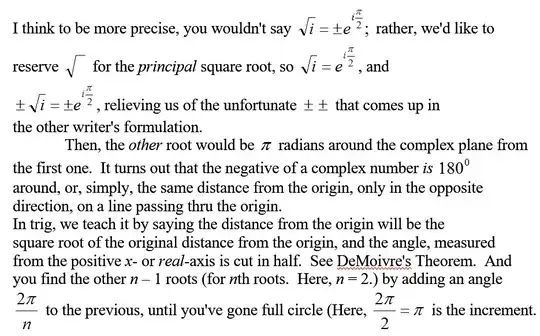I know how to find the solution for a quadratic equation with real coefficients. But if the coefficient changes to complex numbers then what is the change in the solution? Want an example of such equation with solution.
-
3Same as usual formula. Just need to be careful with the branches of square root. – copper.hat Jul 07 '14 at 18:57
-
But how to find the two square roots of a complex number ?? – Bob Jul 07 '14 at 19:00
-
"How to find the two square roots of a complex number" -- see the link in my answer below. – mweiss Jul 07 '14 at 19:01
-
1Write the complex number in exponential form (for example, $i = e^{i {\pi \over 2}}$, hence $\sqrt{i} = \pm e^{i {\pi \over 4}} = \pm {1+i \over \sqrt{2}}$). – copper.hat Jul 07 '14 at 19:06
2 Answers
It's no different. The quadratic formula works regardless of whether the coefficients are real or complex.
Consider the example $$(3+i)x^2 + (2-i)x + (5+2i) = 0$$
The quadratic formula gives
$$x = \frac{-(2-i) \pm \sqrt{ (2-i)^2-4(3+i)(5+2i) } }{2(3+i)}$$
Simplifying this is kind of a pain, of course. Under the radical you have to multiply everything out and combine terms. Eventually you get the radical into the form $\sqrt{M+Ni}$ where $M$ and $N$ are some constants -- in this example, they will be integers. Then the question is, how do you simplify the square root of a complex number? (For that, see How do I get the square root of a complex number?).
Let's see if this works. Kind of unclear how to use these tools, so I just was going to snapshot a quick writeup.
- 129,973
- 11
